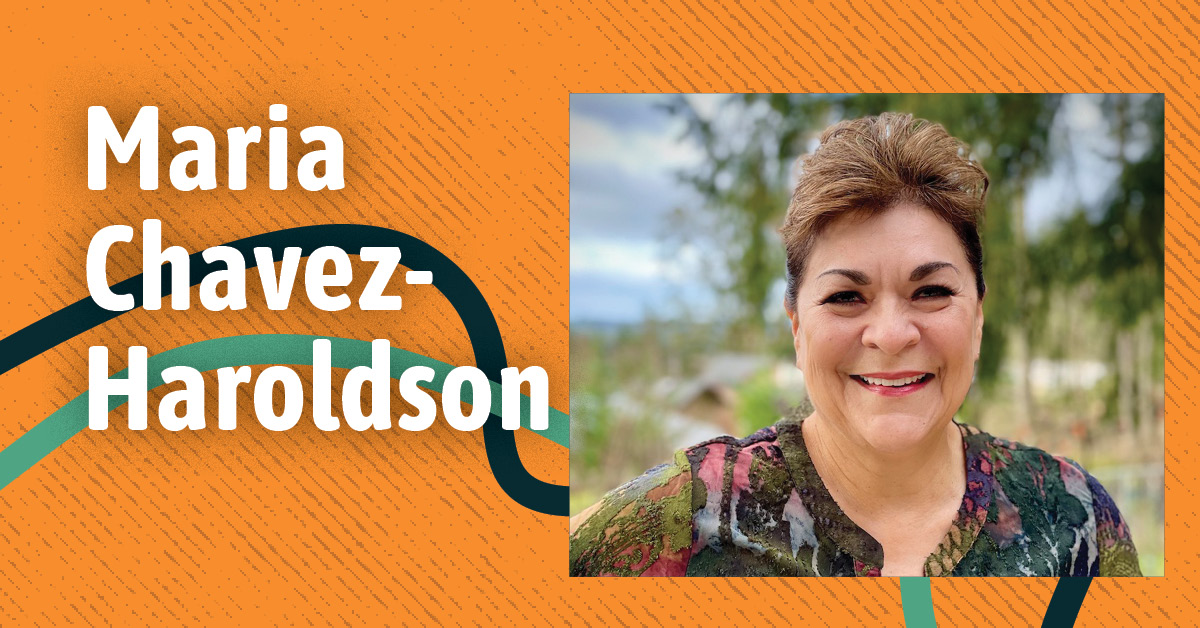“Returning to school, joining the world of higher education—that’s my revolutionary act against social injustice,” says Maria Teresa Chavez-Haroldson, a 2020 graduate of Antioch’s PhD in Leadership and Change. As an immigrant to the US—Chavez-Haroldson was born in Mexico—she sees her own entry into American academia as a triumph over systemic exclusion and specifically against the exclusion often created by a culture centered around individualism over collective needs.
If higher education is Chavez-Haroldson’s big revolution, her working life is a torrent of small ones. “As you can see by my career,” she says, “I jump everywhere like popcorn, because I want to have as much impact as possible on the architectures of institutions that are inequitable.” In her home city of Corvallis, Oregon, she has worked in complex systems, for example courts, K-12 and higher education, non-profits, and as a consultant. Today she works serving multiple counties in Oregon.
It’s vital work. Chavez-Haroldson has spent her life helping unintegrated and underserved community members navigate complex systems which are not designed to be inclusive of diverse populations. She says, “I have no fear of highly complex institutions. I can thrive in the midst of that chaos.” This fearlessness is one of her great powers, and it’s one that she earned the hard way. This work inspired the writing of her dissertation, which explores how equity and diversity focused leaders in higher education might draw from their cultural experiences and backgrounds to develop more inclusive, diverse, and equitable organizations. Ultimately, all of Chavez-Haroldson’s efforts are focused on the power of sharing information and fostering leadership, both for those leading organizations and for those experiencing systemic barriers.
A Background Navigating Different Barriers
Chavez-Haroldson was born in Chihuahua, Mexico, where she lived the first few years of her life before coming to the United States. Immigration was a choice and a challenge for her parents who ultimately became bilingual and bicultural. The pressure to assimilate was a challenge for Chavez-Haroldson, however, she attributes her tenacity and grit to her identity and cultural roots. She dropped out of high school, and soon after that she became a mother. She focused on her family, and continued to face institutional barriers. She realized she needed to return to her academic goals and made a decision to enroll in college at age forty.
Having a child while still quite young herself, needing to leave high school, and taking a very circuitous route to college gave her many experiences of how institutions in the United States are designed to exclude. “If you don’t speak the language, and you don’t look like you’re supposed to, and you don’t act like you’re supposed to, then therefore you don’t belong,” she says “Throughout my journey I’ve gained the power to not fear the complexities, because I’ve lived that fear.”
Chavez-Haroldson earned a Bachelors in Human Services in 2004, and at the same time she began working for the District Attorney’s Office in McMinnville, Oregon, where she served as the director of the Crime Victim’s Unit. In 2010 she began work as a Court Appointed Special Advocates Director. In 2013 she earned a Master’s in Public Administration and became the Director of the Office of Inclusion and Intercultural Relations of the Oregon Youth Authority. Simultaneously, since 2008, she’s worked as an Equity, Diversity and Inclusion (EDI) consultant.
These roles all have required the common labor of navigating law, policy, and programs—and helping others, often young people, along the way. “I consider myself a navigator,” says Chavez-Haroldson, “That’s the richest form of learning for me. I can study a system that is supposedly blocking me. I can see where the barriers are, and I can ask why they exist.”
It was after cementing her practice as a navigator that Chavez-Haroldson became interested in studying at Antioch’s PhD in Leadership and Change. The fact that this program was flexible and low-residency made it possible for her to continue working, realize her passion for social change, and ultimately reach her academic goals. She remembers thinking, “I know nothing about a doctoral program, but why not? It’s another complex system.”
Initially, she received some doubt that her English writing skills were adequate to enter a doctoral program. She says, “That was a barrier. I kept going.” She spoke with Antioch faculty, and she was admitted to the program in 2013. This was a triumph—she saw getting into the PhD in Leadership and Change as a victory, but it was one secured not by submitting to the uncertainty of the process but by overcoming it with support from her family and her collectivist worldview. She says, “It was powerful because it was me acting as a collectivist.”
A Dissertation Centering Equity Over Diversity
The values of equity, justice, collectivism, and service guided Chavez-Haroldson through the program and especially influenced her dissertation research. For this key part of her studies she decided to look at how dominant cultural values were imbued into every aspect of equitable and inclusive leadership in higher education. She titled the dissertation that resulted from this study LatinX Diversity Officers in Higher Education: Capacitating Cultural Values as Champions of Equity, Diversity and Inclusion. In it, Chavez-Haroldson articulates the ways leaders in education might draw from other cultural experiences and backgrounds to shape an alternative, more sustainable and collectivist form of leadership framed in social justice.
Her methodology was exciting—she used an interpretive phenomenological analysis to conduct and analyze interviews with LatinX Diversity Officers (referred to in the collectivist spirit as “co-researchers”). The result is what she calls a “co-constructed, collective narrative highlighting the urgency to interrupt and change oppressive patterns.” It’s a thought-provoking critique against using models that privilege dominant culture.
The words “Equity, Diversity, and Inclusion” are in the title of the dissertation. This is a slight riff on a phrase that is becoming common in institutions. More commonly these three terms are seen with “Diversity” stated first, so that the acronym is “DEI.” Much of Chavez-Haroldson’s intellectual project is to emphasize the lack of equity in these spaces, and so she has it lead. As she says, “If we don’t understand what inequity means for a person’s identity, or identities, then we may be complicit with the complexities of a system that are excluding certain populations.”
She has seen how nominal diversity present in a system may be used to distract from that system’s essential inequity. This, functionally, ends up recreating lack of diversity and inclusion. Simply including one or two people doesn’t create deep change. Chavez-Haroldson uses the dissertation to explore how organizations will hire Diversity Officers but set them up for failure, because the subtle instruments of inequity, often built into the more individualistic forms of leadership, go unexamined. She believes 21st-century leaders must explore indigenous and non-Westernized forms of leadership in order to remain responsive and relevant to fast-paced demographic shifts in the U.S.
At Antioch, she was excited to learn about the idea that all followers can be leaders, called ensemble leadership, which resonates with her collectivism. As she says, “It’s a theory that beautifully fits a more indigenous way of looking at leadership.” She likens it to a rhizome, a plant whose roots grow horizontally, which creates more energy within and around the plant, making each stalk able to sprout from a shared—collectivist—network.
Discovering New Ways to Challenge Institutions
Chavez-Haroldson thrived in the student culture of Antioch. She felt that she and her fellow students were striving for similar goals, all of which boiled down to a central goal of all Antioch graduates: to win victories for humankind. Her collectivism, which she links to her Mexican-American culture, resonated with the collaborative structure of the program. As she says, “The social elements of Antioch, with a diverse group of students, was collectivist. It was a sharing of lived experience.”
Chavez-Haroldson completed her PhD program in 2020, and she is energized by the new ways in which she can articulate her ideas. While continuing to offer her services as an EDI consultant, she has recently taken up a position as Regional EDI Director for the Willamette Education Services District in Salem, which is Oregon’s capital. Here she offers her deeply developed skills in institutional and organizational development.
But it’s also a struggle. By definition, the places where Chavez-Haroldson can make the greatest impact are those with the least amount of like-minded individuals. As she says, “I dream about one day working with a team of EDI practitioners, and not doing this alone.” Until then, she continually strives to honor the sacrifice of her parents. Through her work in education, she teaches people to overcome and lead change in the systems that oppress them. As she says, “If I can make someone not fearful, then that’s a victory for humankind. That’s my contribution for the day.”



